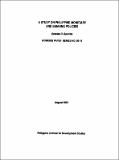| dc.contributor.author | Bautista, Ernesto D. | |
| dc.coverage.spatial | Philippines | en_GB |
| dc.date.accessioned | 2014-04-04T17:05:59Z | |
| dc.date.available | 2014-04-04T17:05:59Z | |
| dc.date.issued | 1992 | |
| dc.identifier.citation | Bautista, E.D. (1992) A study on Philippine monetary and banking policies. Working paper series, 9211. Manila: PIDS. | en_GB |
| dc.identifier.uri | https://opendocs.ids.ac.uk/opendocs/handle/20.500.12413/3758 | |
| dc.description.abstract | During the past few decades, control over monetary and financial market policies was usec
by governments in most developing countries as an important tool in their development strategies.
To accelerate industrialization under an import substitution strategy, many countries including the
Philippines intervened pervasively in their financial markets through selective creditpolicies, interest
rate controls, fiscal or tax incentives and overvaluation of the currency. A few, such as South Korea
and Singapore, attempted early on to integrate their economies with international markets through an
export-based strategy. Most developing countries believed that without interventions in their
financial markets, financial institutions would continue to service only the most capitalized sectors,
neglecting the rural and other sectors considered to be at the forefront of development. | en_GB |
| dc.language.iso | en | en_GB |
| dc.publisher | Philippine Institute for Development Studies | en_GB |
| dc.relation.ispartofseries | PIDS working paper series;9211 | |
| dc.rights.uri | http://www.ids.ac.uk/files/dmfile/IDSOpenDocsStandardTermsOfUse.pdf | en_GB |
| dc.subject | Economic Development | en_GB |
| dc.subject | Finance | en_GB |
| dc.title | A study on Philippine monetary and banking policies | en_GB |
| dc.type | Series paper (non-IDS) | en_GB |
| dc.rights.holder | Philippine Institute for Development Studies | en_GB |
| dc.identifier.externaluri | http://www.pids.gov.ph/publications.php | en_GB |
| dc.identifier.koha | 99147 | |

